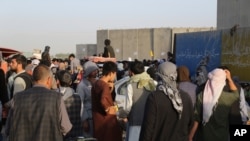Western governments warned Thursday of the threat of a terror attack at the airport in Kabul, Afghanistan, and said those gathered in the area seeking evacuation from the country should move to a safe location.
"Because of security threats outside the gates of Kabul airport, we are advising U.S. citizens to avoid traveling to the airport and to avoid airport gates at this time unless you receive individual instructions from a U.S. government representative to do so," the U.S. Embassy in Kabul said in a statement. "U.S. citizens who are at the Abbey Gate, East Gate, or North Gate now should leave immediately."
British Armed Forces Minister James Heappey told BBC radio, “There is now a very, very credible reporting of an imminent attack.”
Australia’s Foreign Affairs and Trade Department also cited an “ongoing and very high threat of terrorist attack,” while Belgian Prime Minister Alexander De Croo said his government ended its evacuation operations after hearing from the United States and other sources about a possible attack.
U.S. Secretary of State Antony Blinken reiterated Wednesday that the United States sees a potential threat from the Islamic State group’s affiliate in Afghanistan.
"It's hard to overstate the complexity and the danger of this effort," Blinken said at the State Department. "We're operating in a hostile environment in a city and country now controlled by the Taliban, with the very real possibility of an ISIS-K attack. We're taking every precaution, but this is very high-risk."
The United States is pledging to continue efforts to extricate Americans, U.S. permanent residents, allies and other vulnerable Afghans, even if it means going past the end-of-the-month deadline for American forces to leave Afghanistan.
There is "no deadline in getting out Americans and Afghans who want to leave past August 31," Secretary of State Antony Blinken said.
"The will not be forgotten," Blinken emphasized as he responded to reporters' questions. "And as I said, we will use every diplomatic, economic assistance tool at our disposal to pressure the Taliban to let people leave the country."
The White House said Thursday that since August 14, the United States has evacuated or helped evacuate about 95,700 people on U.S. military and coalition flights.
Throughout Wednesday at the State Department, the Pentagon and the White House, officials continued to rebut criticism about chaos at the gates of Kabul's airport.
The White House said Wednesday that since Aug. 14, the United States has evacuated or helped evacuate about 82,300 people on U.S. military and coalition flights in one of the largest airlifts in history. Since the end of July, the U.S. has relocated about 88,000 people, nearly half of them women and children.
"We're on track to have the largest U.S. airlift in history. And I think that speaks for itself," Jen Psaki, the White House press secretary, told reporters.
As many as 1,500 American civilians remain in Afghanistan. There were about 6,000 Americans in Afghanistan on Aug. 14, according to Blinken, when Taliban insurgents took military control of the country and evacuations began. But since then, he said, at least 4,500 Americans have been airlifted out of the country, including 500 in the past day.
About 10,000 people hoping to escape the country are currently crammed in the airport in Kabul, according to U.S. officials who say a total of 90 U.S. military and international flights flew from Kabul in the past day.
It "will not be an American responsibility" to control security at the airport after Aug. 31, according to Pentagon spokesperson John Kirby.
Officials at the Pentagon and White House on Wednesday urged U.S. lawmakers to not travel to Kabul to witness the evacuation after Representatives Seth Moulton, a Democrat, and Peter Meijer, a Republican — both of whom served military tours of duty in the Mideast — made an unannounced trip to the Afghan capital this week to assess the situation.
"We conducted this visit in secret, speaking about it only after our departure, to minimize the risk and disruption to the people on the ground, and because we were there to gather information, not to grandstand," the lawmakers said in a joint statement.
The lawmakers released their statement after flying out of Kabul on a chartered plane. They said that in their view, after seeing the situation firsthand and speaking to commanders on the ground, "we won't get everyone out" before President Joe Biden's Tuesday deadline.
House Speaker Nancy Pelosi issued a statement Tuesday saying travel to the region by lawmakers would divert resources from the evacuation operation.
"Given the urgency of this situation, the desire of some (members of Congress) to travel to Afghanistan and the surrounding areas is understandable and reflective of the high priority that we place on the lives of those on the ground," Pelosi said. "However, I write to reiterate that the Departments of Defense and State have requested that (lawmakers) not travel to Afghanistan and the region during this time of danger. Ensuring the safe and timely evacuation of individuals at risk requires the full focus and attention of the U.S. military and diplomatic teams on the ground in Afghanistan."
Other lawmakers are seeking hearings about what went wrong with the U.S. departure from Afghanistan.
"The House Foreign Affairs Committee intends to conduct oversight to evaluate the policies that led to the Taliban's reestablishing control of the country, including those that drove the Trump administration's February 2020 agreement, and how this will impact the United States' broader Afghanistan and counterterrorism strategy," the committee's chairman, Democrat Gregory Meeks, said in a statement Wednesday.
Biden "has signed the death warrant for thousands of Afghans who helped us," Republican Senator Lindsey Graham told the Fox News cable news network, calling for the president's impeachment for "dereliction of duty" as the commander in chief.
Blinken was asked by a reporter Wednesday whether those in the Biden administration, in power for seven months, are willing to accept responsibility for the recent U.S. shortcomings regarding Afghanistan.
"I take responsibility. I know the president has said he takes responsibility. And I know all of my colleagues across government feel the same way," Blinken said.
He added there will be plenty of time to look back and see what might have been done differently and more effectively, but right now, "my entire focus is on the mission at hand."








